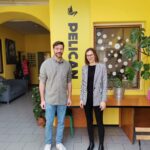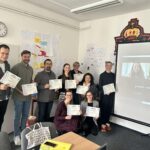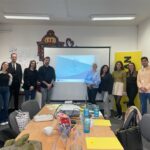Artificial Intelligence in Adult Education and Self-Learning: Providing personalized and adaptive learning experiences with emphasis on language learning
2023-1-DE02-KA220-ADU-000155302
The Erasmus+ project aims to use AI technologies in adult education and self-learning, particularly language learning, to create personalized and flexible learning experiences that better meet the needs and goals of individual learners. Desired outcomes include improved learning outcomes, increased engagement and motivation, better access to educational and self-learning opportunities, and the development of key language skills for the global labor market.
The project remains in line with the priority of addressing the digital transformation by promoting the targeted use of digital technologies in education, training, youth and sport for teaching, learning, assessment and engagement. Through the use of AI technologies such as speech recognition, machine translation and natural language processing, the project aims to create more engaging and interactive language learning experiences. It also supports the development of digital teaching methods and expertise for teachers and the use of the European Digital Competence Framework for teachers, citizens and organizations.
The project started in December 2023 and will run for 30 months (12/2023 - 05/2026).
In addition to JGU, the partners involved in the project are the social enterprise PRISM (Italy), the One World - One Heart Foundation (Poland), the adult education center PELICAN (Czech Republic), the continuing education center Emphasys (Cyprus) and Bahcesehir University (Turkey)
AI IN ADU Website and Social Media
Our project website is now online! It offers interesting insights into our project activities as well as regular news about digital storytelling and shadow theater. Interested parties will also have access to the upcoming materials we are developing as part of the project.
Website: AI in education
We are also represented with the project on Instagram and Facebook. Follow and discuss with us recent developements.
Instagram: (@ai.ineducation) Instagram ai.ineducation
Facebook: https://www.facebook.com/profile.php?id=61558032667473
Invitation Final Conference
The project AI in Adult Education and Self-Learning is approaching its conclusion. Over the past months, the project has explored the potential of artificial intelligence to support adult education and self-directed learning, with a particular focus on language learning, accessibility, and innovative educational practices.
To mark the completion of the project, we cordially invite all interested parties to attend our Final Conference on 22 May 2026. The conference will be held in a hybrid format, allowing participation both online and on site at the Johannes Gutenberg University (JGU) campus.
During the final conference, the project consortium will present the project’s objectives, activities, and key results. Participants will have the opportunity to explore and test selected project outputs and to engage in discussions with project partners and other attendees. A particular focus will be placed on reflecting on the results and exchanging ideas on future development opportunities and potential applications in adult education and self-learning contexts.
If you are interested in participating, please send an email to ai-erasmusplus@zww.uni-mainz.de including the following information:
- First name
- Last name
- Date of birth
- Preferred mode of participation (on site or online)
We look forward to welcoming you to the final conference and to an inspiring exchange on the future of AI in adult education.
3rd Transnational Partner Meeting in Palermo (23–24 September 2025)
From 23 to 24 September 2025, the AI in Language Teaching project team met for its 3rd transnational partner meeting (TPM) at our Italian partner PRISM in Palermo. PRISM is a non-profit organisation with the aim of promoting equal opportunities for the advancement of societies, communities and individuals. In this inspiring environment, intensive work was carried out on the next steps of the project.
The meeting focused on the next steps of the project:
- Planning further podcasts: The team plans to record additional podcast episodes specifically aimed at self-learners, containing practical tips for independent language learning with AI.
- Launch of the pilot phase in November: The partners jointly prepared for the launch of the pilot phase for the developed project materials, which are to be used from November onwards. In this phase, interested self-learners and (language) teachers will have the opportunity to test the materials in practice, provide feedback and further develop them.
All interested self-learners and (language) teachers who would like to try out and help shape the tools and content are welcome to participate. If you are interested or have any questions, please send a message to ai-erasmusplus@zww.uni-mainz.de.
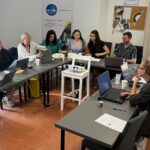
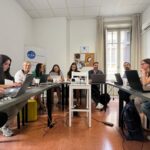
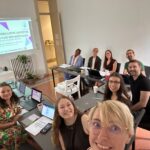
Newsletter 2 – August 2025
The second newsletter presents the latest project developments, including new Key Feature results from our user research, engaging podcast discussions now available on YouTube, and highlights from the second transnational partner meeting in Cyprus. It also offers a preview of upcoming guidelines and interactive learning materials that will be tested later this year.
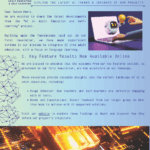
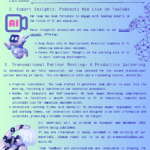
Project presentation at the EPALE and Erasmus+ Conference 2025 in Vienna
On 9 April 2025, the Erasmus+ project "AI in Adult Education and Self-Learning" was presented at the conference "Artificial Intelligence meets Adult Education: Promoting Innovation, Strengthening Competences" in Vienna. Mark Reinhard presented the project on behalf of the consortium both at an information market and in a thematic workshop.
The project aims to use AI tools to promote individual learning paths for adults and thus support self-directed, flexible learning. At the information stand, visitors were able to find out more about the project using a poster and talk directly to the project team.
The subsequent workshop initially focussed on the use of artificial intelligence in adult education. After an in-depth presentation of the project, an interactive World Café invited discussion. The participants intensively explored three key questions:
- What opportunities does AI harbour in adult education?
- What challenges are associated with it?
- How can project results be sustainably secured and transferred into practice?
The discussions showed great interest and a high level of willingness to engage with the potential and limitations of AI in an educational context.
If you would like to find out more about the project or receive regular updates, you can register for the newsletter by emailing projects@zww.uni-mainz.de.
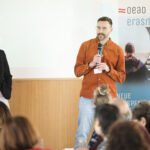
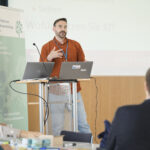
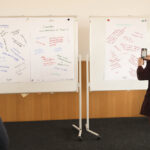
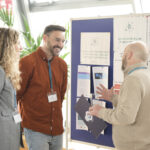
Newsletter 1 – January 2025
Our first newsletter introduces the “AI in Adult Education and Self-Learning” project and provides insights into the progress made so far. It highlights the launch of our project website, initial findings from user research on AI in language learning, and interviews with teachers and learners. In addition, it announces the upcoming transnational partner meeting in Cyprus, where partners will discuss next steps for the project’s implementation.
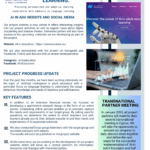
Second partner meeting on 20 and 21 January 2025 in Nicosia, Cyprus
On 20 and 21 January 2025, the project partner EMPHASYS hosted the second transnational partner meeting in Nicosia (Cyprus). The meeting took place in hybrid form. The AI in ADU team worked together to finalise the first project results. The next steps and work packages were also discussed in detail and finalised. Further materials are being created to familiarise trainers and self-learners with the use of AI.
The project is making great progress. We are already looking forward to publishing the first project results on the homepage soon.
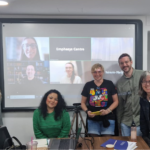
Progress Update
Over the past few months, we have been working intensively on the topic of ‘artificial intelligence in adult education’ with a particular focus on language learning to understand the usage behaviour, knowledge and needs of teachers and self-learners.
In addition to an extensive literature review, we focussed on developing a quantitative research design in the form of an online survey. Conducting online surveys enables us to precisely capture the needs and requirements of our target group. By asking specific questions, we determine the extent to which teachers and self-learners already use AI, their attitude towards AI and their needs and expectations of AI-supported solutions.
We also conducted focus group interviews with the target group and recorded podcasts with experts. The results will soon be published on the project website.
At the same time, we are working on the development of our project website, which will serve as a central platform for information, resources and dialogue with interested parties.
In January 2025, all project partners will meet for their second transnational meeting in Cyprus. We will take the opportunity to present our progress to date, discuss ideas together and define the next steps for the successful implementation of ‘AI in Adult Education and Self Learning’.
First Partner Meeting in Brno, Czechia, March 26th and 27th 2024
The Erasmus+ project "AI in ADU - Artificial Intelligence in Adult Education and Self-Learning" has started with the first partner meeting in Brno, Czech Republic!
On March 26 and 27, we met with partners from Poland, Italy, Czechia, Cyprus and Turkey to plan the next steps.
The project aims to develop personalized and adaptive learning paths in language acquisition. It is investigating how artificial intelligence (AI) can be used to meet individual needs. In addition to podcasts with experts, guides for better learning and teaching experiences are being created.
